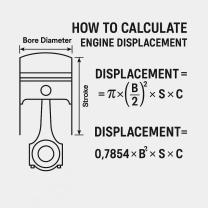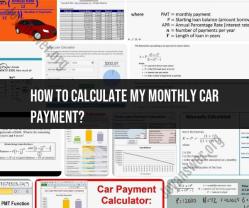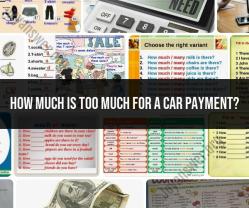How to purchase a car from a private seller?
Purchasing a car from a private seller can be a straightforward process if you take the right steps and precautions. Here's a step-by-step guide to help you buy a used car from a private seller:
Determine Your Budget: Before you start looking for a car, establish a budget that includes the purchase price, taxes, registration, insurance, and any anticipated maintenance or repairs.
Research the Car: Identify the make, model, and year of the car you want. Research the vehicle's market value, reliability, and common issues. Check automotive websites, reviews, and forums for information.
Locate Potential Sellers: You can find private sellers through various sources, including online classifieds like Craigslist, local newspapers, word-of-mouth, and "For Sale" signs on parked cars.
Contact the Seller: Reach out to the seller and ask questions about the car. Inquire about the vehicle's history, maintenance records, mileage, and reason for selling. Verify that the car matches the description in the ad.
Arrange a Meeting: Set up a convenient time and place to inspect the car. It's advisable to meet in a well-lit public location during daylight hours.
Inspect the Car: When you meet the seller, carefully inspect the car. Look for signs of damage, rust, or wear. Check the tires, brakes, engine, and all major systems. If you're not mechanically inclined, consider hiring a trusted mechanic to perform a pre-purchase inspection (PPI) before finalizing the deal.
Review Documentation: Ask to see the car's title, service records, and a vehicle history report (such as a Carfax). Ensure the VIN on the title matches the car, and confirm the seller's identity.
Test Drive: Take the car for a test drive. Pay attention to how it drives, accelerates, and handles. Listen for any unusual noises. Test the brakes, steering, and transmission.
Negotiate the Price: If you're satisfied with the condition of the car, negotiate the price with the seller. Research similar cars in your area to get an idea of a fair market value.
Agree on Terms: Once you agree on a price, establish the terms of the sale. This includes the payment method (cash, certified check, or other secure methods), the sale price, and any additional conditions.
Bill of Sale: Create a bill of sale that includes the car's details, purchase price, date, and both parties' names and signatures. This document can help protect both the buyer and seller in case of any disputes.
Complete the Sale: Exchange payment and the title. Depending on your location, you may also need to complete a notice of sale or transfer of ownership with your local motor vehicle agency.
Insurance: Ensure that you have insurance coverage before you drive the car. Many insurance companies allow you to add the new vehicle online or by phone.
Finalize Registration and Title: Submit the necessary paperwork to your local DMV or equivalent agency to transfer the title and register the car in your name. Pay any applicable taxes and fees.
Receive the Title: After processing, you should receive the car's title in your name. Keep this document in a safe place.
Remember that buying a car from a private seller carries certain risks, and it's crucial to do your due diligence. If you have any doubts about the car's condition or the transaction, consider seeking the guidance of a legal or automotive professional.
Purchasing a Car from a Private Seller: A Step-by-Step Guide
Buying a car from a private seller can be a great way to save money, but it's important to do your research and be prepared before you make an offer. Here's a step-by-step guide to help you through the process:
Research and Preparation Before Buying from a Private Party
Before you start looking at cars, it's important to do your research and know what you're looking for. This includes:
- Deciding on a budget: How much money are you willing to spend on a car?
- Choosing a make and model: What type of car do you need? Consider your lifestyle and needs when making your decision.
- Researching specific models: Once you've chosen a make and model, research specific models to learn about their strengths and weaknesses.
- Getting a pre-purchase inspection: Once you've found a car that you're interested in, it's important to get a pre-purchase inspection from a qualified mechanic. This will help you identify any potential problems with the car.
Negotiating Price and Terms with a Private Seller
Once you've found a car that you want to buy, it's time to negotiate price and terms with the seller. Here are a few tips:
- Start low: It's always better to start your negotiation with a lower offer. This will give you room to negotiate up to the price you're willing to pay.
- Be prepared to walk away: If you can't agree on a price, be prepared to walk away from the deal. There are plenty of other cars out there.
- Consider financing: If you need financing, consider getting pre-approved for a loan before you start looking at cars. This will give you an idea of how much you can afford to spend and will make the negotiation process easier.
Ensuring a Smooth Transaction with a Private Car Seller
Once you've agreed on a price and terms, it's important to ensure a smooth transaction. Here are a few tips:
- Get everything in writing: Be sure to get a written bill of sale from the seller. This document should include the following information:
- The make, model, and year of the car
- The VIN number
- The purchase price
- The date of sale
- The signatures of the buyer and seller
- Transfer the title: The seller will need to transfer the title of the car to you. This process will vary by state, so be sure to check with your local DMV.
- Insure the car: As soon as you buy the car, you'll need to purchase insurance. You can get quotes from multiple insurance companies to find the best deal.
Legal and Documentation Considerations in Private Car Sales
There are a few legal and documentation considerations that you should keep in mind when buying a car from a private seller:
- Vehicle history report: It's a good idea to get a vehicle history report on the car before you buy it. This report will show you if the car has been in any accidents or has any other liens on it.
- Emissions test: If you live in an area that requires emissions testing, you'll need to get the car tested before you can register it.
- Registration and license plates: Once you have the title and insurance for the car, you can register it and get license plates. This process will also vary by state, so be sure to check with your local DMV.
By following these tips, you can safely and smoothly buy a car from a private seller.











